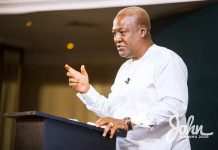The Acting Director-General of the State Interests and Governance Authority (SIGA), Prof. Michael Kpessa-Whyte, has called for a drastic shift in how Ghana’s State-Owned Enterprises (SOEs), Joint Venture Companies (JVCs), and Other State Entities (OSEs) are managed to ensure their long-term profitability and sustainability.

Speaking at an editors’ forum in Accra on Thursday, to discuss the 2024 State Ownership Report (SOR), Prof. Kpessa-Whyte said many state enterprises continue to underperform financially because they have not evolved from their original social-service mandates to operate as commercial entities.
He cited the Electricity Company of Ghana (ECG) and the Ghana Water Company Limited (GWCL) as examples, explaining that these institutions were initially established to provide essential services rather than to generate profit.
“The commercialisation of these entities began in the 1980s, but without proper integration of business models.
“As a result, the old policy frameworks, managerial structures, and mindsets have remained unchanged,” he noted.
The 2024 State Ownership Report, the ninth in the series and fourth since SIGA’s inception in 2019, provides a detailed analysis of the financial and operational performance of 152 specified entities comprising 54 SOEs, 30 JVCs and 68 OSEs.
The report shows that the SOE sector’s total revenue grew by 28.3%, reaching GH¢133.68 billion in 2024, largely driven by gains in the energy and financial services sub-sectors.
However, despite this revenue growth, the sector posted a deepened net loss of GH¢9.67 billion, up from GH¢7.14 billion in 2023, mainly due to high finance costs amounting to GH¢9.39 billion.
While operational efficiency improved, and profit before interest and tax (PBIT) rose to GH¢1.57 billion, the report highlighted persistent losses from entities such as Ghana Cylinder Manufacturing Company, GNPA, Ghana Water Company, Graphic Communications Group and Tema Oil Refinery.
These continue to pose major fiscal risks to the state.
On a brighter note nine SOEs — including Ghana Ports and Harbours Authority (GPHA), Bui Power Authority, Ghana National Gas Company (GNGC) and Bulk Energy Storage and Transportation Company (BOST) maintained consistent profitability over the past five years.
Three SOEs, namely Ghana Reinsurance Company Ltd, TDC Company Ltd. and State Housing Company Ltd. (for the first time in 30 years) paid a combined GH¢29.36 million in dividends, marking a 78.9% increase from the previous year.
Improved Performance Among JVCs
Joint Venture Companies recorded a strong recovery, moving from a net loss of GH¢1.33 billion in 2023 to a net profit of GH¢1.51 billion in 2024 — a 213% improvement.
Total JVC assets grew by nearly 40%, while dividend contributions surged, led by minority-interest companies which paid GH¢1.03 billion, representing 91% of total dividends received by the state.
Other State Entities Narrow Losses
Other State Entities (OSEs) also showed signs of recovery, recording a net deficit of GH¢2.4 billion, a sharp reduction from GH¢7.72 billion in 2023.
However, the sector continues to face financial instability, with accumulated negative funds of GH¢12.54 billion, largely due to the Bank of Ghana’s negative equity position of GH¢58.62 billion.
Macroeconomic and Policy Context
The report notes that Ghana’s economy grew by 5.7% in 2024, with moderate inflation at 23.8% and a stabilised cedi.
Despite this, the fiscal deficit widened to 7.9% of GDP, while public debt rose to GH¢726.7 billion, though it improved relative to GDP at 61.8%, following debt restructuring and Eurobond renegotiations.
To address governance gaps, SIGA and the government introduced two key policy instruments in 2024, the State Ownership Policy and the Code of Corporate Governance for Specified Entities to institutionalise accountability and improve performance across public organisations.
Key investments during the year included: Ghana Gas Company’s acquisition of Ghana Cylinder Manufacturing Company; Commissioning of the US$40 million GOIL–SMB Bitumen Processing Terminal; Nuclear Power Ghana’s agreement to deploy Nu Scale’s Small Modular Reactor by 2030; Launch of the Jomoro Petroleum Hub Development, valued at US$12 billion, expected to create 780,000 jobs by 2036.
Challenges and Calls for Reform
The report also highlighted worrying trends, such as a decline in climate-smart initiatives, limited gender diversity (only 29.67% of SE workforce are women), and low youth participation at 2.6%.
Finance Minister Dr. Cassiel Ato Forson, in his remarks, acknowledged the ongoing challenges, stressing the need for SOEs to deliver better returns.
“The task ahead is immensely difficult, given the dismal nature of the 2024 performance. The Ghanaian people expect SOEs to deliver and offer value as their shareholders,” he said.
He urged SIGA to strictly enforce reporting deadlines and sanction non-compliant entities, while accelerating reforms under the IMF-supported Post-COVID-19 Programme for Economic Growth (PC-PEG).
Prof. Kpessa-Whyte reiterated SIGA’s commitment to driving reforms that ensure SOEs become viable, transparent, and accountable.
“We must rethink the way state enterprises operate. They must evolve beyond social service delivery to become engines of growth, efficiency and national prosperity,” he said.
Follow the The Chronicle Newspaper channel on WhatsApp: https://whatsapp.com/channel/0029VbBSs55E50UqNPvSOm2z









